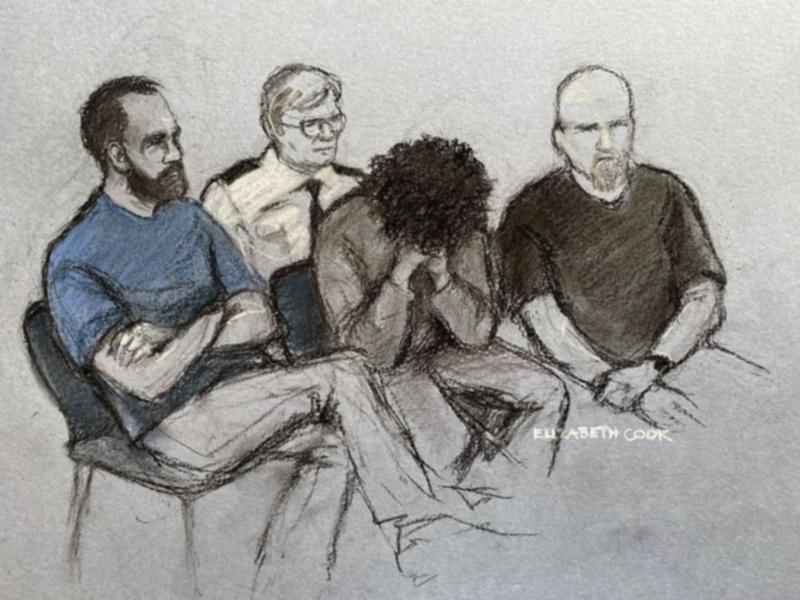Southport stabbing: Axel Rudakubana charged with possession of ricin poison chemical and Al Qaeda material
Police found the deadly chemical and the terror training manual at 18-year-old Axel Rudakubana’s home just days after a knife spree at a Taylor Swift-themed holiday gathering left three young girls dead.

The 18-year-old Southport murder suspect has been charged by UK police with making ricin poison and possessing Al Qaeda material.
Axel Rudakubana is accused of murdering three young girls during a knife rampage at a Taylor Swift-themed holiday club in the UK beach town in July. Within days of the attack, police found the deadly ricin chemical at the teenager’s home as well as information relating to an Al Qaeda terrorist training manual.
However, he was not formally charged with either offence until Tuesday– prompting questions over why the information was withheld for so long.
Sign up to The Nightly's newsletters.
Get the first look at the digital newspaper, curated daily stories and breaking headlines delivered to your inbox.
By continuing you agree to our Terms and Privacy Policy.Leading UK Conservative politicians called on police, prosecutors and the Government to explain their actions to the public.
Party leadership candidate Robert Jenrick said he was concerned information may have been kept back and told UK Prime Minister Sir Keir Starmer to inform the country: what he knew about the Southport attack and when he learned it”.
Tory rival Kemi Badenoch said there were “serious questions to be asked of the police, the CPS and also of Keir Starmer’s response to the whole situation”.
The comments came three months after the killings of Bebe King, six, Elsie Dot Stancombe, seven, and Alice Dasilva Aguiar, nine, at a dance class in Southport.
Eight other children and two adults were also seriously injured.

The attack in the seaside town sparked large-scale riots across the country, fuelled by misinformation on social media.
More than 1,000 arrests have since been made and hundreds charged and jailed.
Sources told the Daily Mail yesterday that all police leave has been cancelled at the Merseyside force and neighbouring constabularies in light of the latest charges.
Armed officers have also been stood up as a preventative measure in case of further trouble.
Downing Street yesterday said it was “not correct” to suggest the Government had withheld facts from the public or that it had a hand in the timing of charges.

It said all such decisions were “for the Crown Prosecution Service (CPS)“.
At a briefing at Merseyside Police’s headquarters yesterday afternoon, Chief Constable Serena Kennedy said the CPS had authorised them to charge Rudakubana with manufacturing the biological toxin ricin.
As little as 0.5mg of ricin – which officers said was found at the property he shared with his parents and older brother – can kill a human.
She added that the force had also been authorised to charge him with possessing terrorist material – namely Military Studies in the Jihad Against the Tyrants: The Al Qaeda Training Manual.
The academic analysis written by a former CIA officer, quotes the original training document at length.
It is an offence under terror legislation to download or possess it.
Ms Kennedy stressed that the health risk to the public and emergency services who responded to the attack on July 29 was “low or very low” and that no one had been contaminated or harmed as a consequence.
She also said that, although Rudakubana has been charged with offences under both the Biological Weapons Act 1974 and the Terrorism Act 2000, the incident had not been declared terror-related.
Ms Kennedy said that, in order for that to happen, police needed to be sure the suspect had a terrorist ideology or motivation. There is currently no suggestion this exists in Rudakubana’s case.
“At this time, Counter Terrorism Policing has not declared the attack on Monday 29 July a terrorist incident,” Ms Kennedy said. “I recognise that the new charges, may lead to speculation. The matter for which Axel Rudakubana has been charged with under the Terrorism Act does not require motive to be established.”
The senior officer insisted that speculation online that police were “keeping things from the public” was “not the case”. But she said she was restricted in what she could say because it was vital Rudakubana’s right to a fair trial was protected to secure justice for the three girls and the victims who survived.
Ms Kennedy said: “Following the events of Monday 29 July, searches of Axel Rudakubana’s home address resulted in an unknown substance being found – testing confirmed the substance was ricin.
“We have worked extensively with partners to establish that there was a low to very low risk to the public – and I want to make that reassurance clear.”
She urged people against speculating about Rudakubana’s motive online, adding: “My plea is to be patient, don’t engage in rumour and speculation and don’t believe everything you read on social media.
“We must not lose sight of the families of Elsie, Bebe and Alice, who are still grieving, and the families of those children and adults who were injured and affected by what happened on that day.
“We all need to do the right thing by them to ensure the justice process is not prejudiced.”

Rudakubana will appear at Westminster Magistrates’ Court today. He is due to enter a plea to the murder and attempted murder charges next month.
Professor Tim Atkins, from the Government’s Defence Science and Technology Laboratory in Wiltshire, said they worked with Merseyside Police to confirm the substance was ricin.
Dr Renu Bindra, a senior medical adviser at the UK Health Security Agency, said experts immediately undertook a thorough public health risk assessment around the suspect’s home in the village of Banks, Lancashire, and the dance studio in Southport where the attack took place.
She added: “This information confirmed that there was no evidence that any victims, responders or members of the public were exposed to ricin either as part of the incident or afterwards.
‘Our detailed initial risk assessment judged that the risk to the community and to the wider public was low. As the police investigation developed, our ongoing assessment was that the risk to the public had reduced even further.
“I appreciate that this information may be concerning. However, I would like to emphasise that there has been no evidence of ricin poisoning in anyone involved or connected to this incident.”
She said people exposed to ricin poisoning will develop symptoms between 24 hours and three days.
Certain serious offences can only be charged with prior consent from the Attorney General, including those brought under the Biological Weapons Act 1974 and Terrorism Act 2000.
The CPS last night confirmed the consent of the Attorney General and the Solicitor General was sought before Rudakubana was charged with the extra offences.
A spokesman said: “The CPS is operationally independent of Government and makes charging decisions based on the legal tests set out in the Code for Crown Prosecutors. As soon as consent was obtained by the law officers [the Attorney General and the Solicitor General], we ensured arrangements were made to properly inform all the affected families.”
Asked why it took almost three months for Rudakubana to be charged with the extra offences, the spokesman said: “As soon as we had sufficient information from the police, we worked carefully to review the evidence and authorise charges as swiftly as possible. This included ensuring arrangements were made to properly inform all the affected families.”
The three girls had been attending the summer holiday club at the Hart Space Community Centre in Southport when they were fatally stabbed. The day after the attack, thousands turned out for a peaceful vigil but a separate protest later erupted into violence outside a mosque in the town. In the following week, protests and rioting took place in dozens of towns and cities across the UK, with asylum centre hotels targeted.
A provisional trial date for Rudakubana has been set for January next year.
